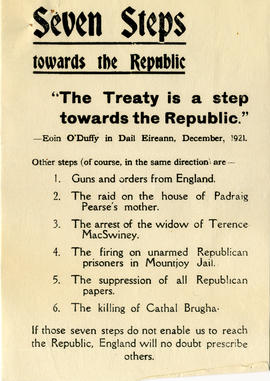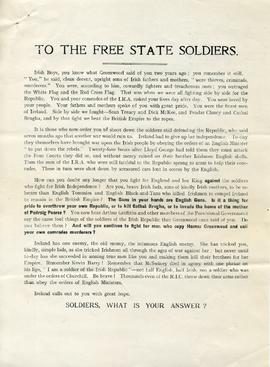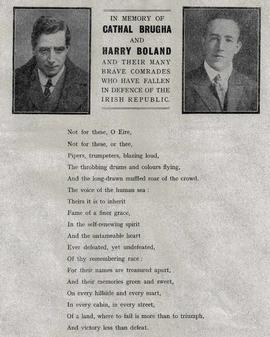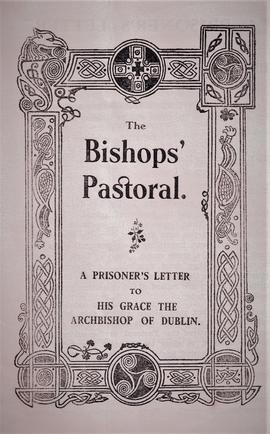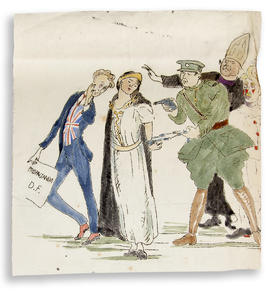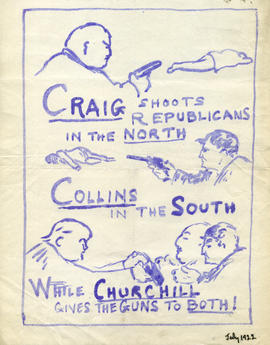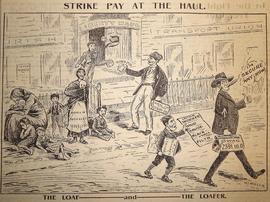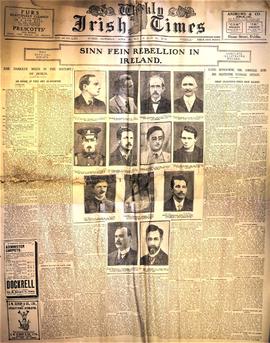Uniform handbills in the Republican interest, starting with:
The Murder Members. The following are the names of the members of the partition parliament who voted for the murder bill. Note: 2 copies; 1 leaf. 31 cm
Seven Steps towards the Republic; 1 p. 19 cm.
On the proper shoulders. At head of text: extracts from the Official Report of proceedings in the English House of Commons (Hansard, June 26th, 1922, Vol. 155, no. 84). 5 copies; [6] pp.; 22 cm.
The new terror ... homes raided in the dead of night; women and children terrorised ... These are some fruits of the Treaty. We will break this new terror as we broke the old. Make no doubt about it. Note: 1 p. 21 cm.
Conspiracy to murder. The Provisional Government has sent an agent to the south to assassinate Eamonn de Valera. The name of the agent is known. Is this done by the will of the Irish people? Note: 1 p. 17 cm.
Violation of Padraig Pearse's Home. Mrs. Pearse's words to the Free State soldiers; Note: 1 p. 26 cm.
To the Free State Soldiers. Anti-Treaty handbill (black typescript on buff coloured paper), urging Free State soldiers to lay down their arms. Urging the soldiers of the Provisional Government, which includes Arthur Griffith, not to take up arms and/or demean soldiers of the Irish Republic during the Irish Civil War. 1 p. 26 cm.
Murdered. On the murder of Harry Boland. Note: 2 pp; 26 cm.
Provisional Government Offer Valuable Prizes for the Best Answers to the following eighteen questions. Note: 2 copies; 1 leaf; 33 cm.
The Mountjoy “Hotel”. Note. 1 p. 27 cm.
Appeal to the People and Volunteers of Tirconaill. Note: 1 p.; 33 cm.
Resolutions adopted by Padraic Pearse Council A.A.R.I.R., Chicago, Illinois, published by the American Association for the Recognition of the Irish Republic. 14 Oct. 1922. Note: Printed, 4 pp.
Do you know Joe Clark? A leaflet, including the statement of Joseph Clark, on the crimes committed against him by the Free State authorities, dated 13 Nov. 1922. Note: 1 p.; 33 cm.
An Anti-Treaty handbill (black typescript on buff coloured paper), urging Free State soldiers to lay down their arms. It reads: ‘Ireland has one enemy, the infamous English enemy. She has tricked you, kindly, simple lads, as she tricked Irishmen all through the ages of war against her. … The Irish Republic is not dead. A hundred thousand armed men are in Ireland to-day ready to give their lives that it may live. You are killing them as the R.I.C. tried to kill you’.
A handbill, in the republican interest, underlining the emphasis in the articles of the Irish Free State constitution which were declared vital and unalterable by Kevin O’Higgins – ‘on the authority of the King’. Published in Dublin .
Handbill with portraits and verse acclaiming Cathal Brugha (1874-1922) and Harry Boland (1877-1922). Published in Dublin.
Letter dated 13 Nov. 1922, signed Proinnsias Ó Gallchobhair (Frank Gallagher), and addressed to the Most Rev. Edward Joseph Byrne, Archbishop of Dublin (1872-1940). The letter refers to the treatment of Republican prisoners. Published in Glasgow and printed by Kirkwood & Co.
Cartoons attributed to Constance de Markievicz (1868-1927).
• A figure of Hibernia with arms behind her back and chained. Michael Collins (1890-1922), holds a gun to her head. Behind Michael Collins are a bishop and William Thomas Cosgrave, (1880-1965). In front of Hibernia and carrying a piece of paper with the words ‘Propaganda D.F.’, is Desmond Fitzgerald, (1889-1947). The caption reads: Carey Collins - Go down on your b------ knees without any more d-----d fuss swear allegiance to King George and his heirs. : Faker Fitzgerald - Don't listen to Devalera [sic]. I could tell you a lot about great great grandmother and Spanish gold. : The Bishop - Take any other oath that will get you out of your difficulties. : Comic Cosgrave - It was an awful joke talking about freedom, you know.
• The branded arm of James O’Reilly Sketched from life by C de M. View of an arm with the sleeve rolled up to expose branded marks. According to the printed statement on the accompanying page, Stephen Gorman aka James O’Reilly of Ballyblia, Ardee, County Louth, was arrested on 11 September 1922 while travelling on a weekend visit to Drogheda. He was arrested on suspicion that he had taken part in a republican demonstration in Ardee. He was then branded.
Notes: Title printed. Watermarks visible.
Physical description: 1 stencil print: roneo; 32.6 x 19.3 cm. (2 copies).
A series of republican cartoons by Constance Markievicz published during the Civil War attacking various prominent Free State figures including Arthur Griffith and Michael Collins. Two of the cartoons are titled ‘Midnight Assassins’ and refer to supposed threats to the lives of Ėamon de Valera and Erskine Childers. Another affirms that Griffith and Collins are ‘marching heads up into the Empire over the bodies of their murdered Comrades’ whilst another suggests a comparison between James Craig and Michael Collins in terms of their treatment of Republicans. The cartoons may have been published in the Anti-Treaty publication 'The Fenian' (See IE CA IR-1-8-3-5).
'The United Irishman' was an Irish nationalist newspaper co-founded by Arthur Griffith and William Rooney. The first publication was issued on 4 Mar. 1899 it ran until 1906. It was sub-titled ‘A National Weekly Review’. The file contains the issue of 23 Apr. 1904 (Vol. 11 No. 269). This edition published copy correspondence from the Capuchin Friary in Cork relating to the ‘Vindication of Monsignor Persico’ (pp 2-3).
'The Liberator' was a weekly newspaper published by Bernard Doyle from offices in Parliament Street, Dublin. The paper espoused opposition to Jim Larkin, the trade union leader during the Dublin Lockout. Each edition featured elaborate and caustic cartoons and editorials invariably attacking Larkin. The file contains a complete bound run of this short-lived journal: 23 Aug. 1913 (Vol. 1. Nos. 1-14). The file also contains 'The Irish Trade Unionist and Labour Year Book, 1913'. Edited by Bernard Doyle, 48 pp.
The file includes the following editions from mainly national newspapers reporting on the Rising and on subsequent events:
'Cork Examiner', 24 June 1916
'Irish Weekly Independent', 29 Apr. & 6 May & 13 May 1916
'Weekly Irish Times', 29 Apr. & 13 May 1916
'Irish Times', 18 Apr.-1 May 1916; 12 May 1916 (p. 5 only)
'Saturday Herald', 27 May 1916
'Cork Examiner', 6 May 1916
'Freeman’s Journal', 11-13 May 1916; 2 June 1916 (13 May 1916 has pp 5-8 only).
'Irish Independent', 15 May 1916
